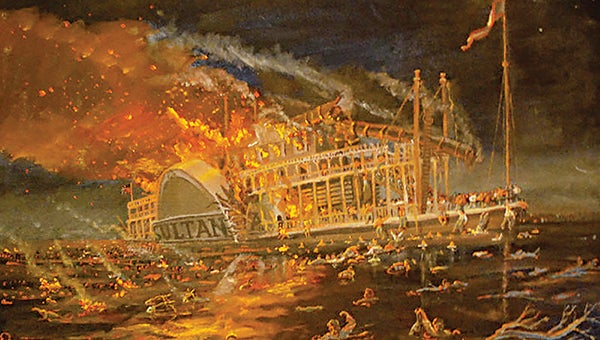Sultana’s story lost amid history
Published 1:23 pm Tuesday, April 28, 2015
Despite remaining one of the most deadly disasters in American history, the loss of the SS Sultana and death of nearly 1,200 passengers aboard was all but forgotten in its day, Ranger Jake Koch told a crowd gathered at Vicksburg National Military Park Monday to commemorate the 150th anniversary of the boat’s disastrous end.
The boat carrying an estimated 2,600 passengers exploded north of Memphis April 27, 1865, killing nearly half of the people on board, Koch said. It had left Vicksburg, April 23, 1865 and the vast majority of its passengers were Union Soldiers who had been held prisoner of war in Andersonville and Cahaba prisons.
“It is the worst maritime disaster in American history. It is important to get the story out,” Koch said.
News of the Sultana disaster traveled as quickly as any information could in the mid 1860s, but it got lost behind what was considered to be the major national news.
The day before the explosion, Lincoln assassin John Wilkes Booth was captured and killed, and Confederate Gen. Joseph. E. Johnston, who failed to relieve Vicksburg in 1863, surrendered the remnants of his army to Union Gen. William T. Sherman.
“That’s the reason nobody’s heard of the Sultana,” Koch said.
The Sultana had a history of trouble and its boilers were constantly being patched. At about 4 p.m. April 23, 1865, the Sultana arrived at Vicksburg and needed repairs. Not wanting to waste time or spend extra money on repairing the boat’s failing boiler, Captain James C. Mason and Boilermaker R.G. Taylor told the steamer’s engineers that it would take several days to repair the boat, but they convinced him to make quick, shoddy work, promising they would get the boiler overhauled in St. Louis.
“These are really just temporary repairs,” Koch said.
That night Mason met with Union Col. Ruben B. Hatch, and, according to later court testimony, was told he could have all the men he could fit on his boat.
“The government is offering $5 per enlisted man and $10 per officer for any steamboat willing to take these guys home,” Koch said.
Mason stood to make a fortune. Hatch told him to get in touch with Capt. Frederic Speed, who temporarily had been placed in charge of filling out the prisoner transport rolls. Speed initially said it was impossible to prepare the rolls in time, but later agreed to let all the men board the Sultana.
After the Sultana exploded, rumors began swirling that someone — possibly Speed — had accepted a bribe of 5 cents a person from Mason in exchange for the prisoners.
Speed was later found guilty at trial, but his conviction was vacated by the Judge Advocate General.
“He was found to have been at the parole camp all day and never even seen the Sultana,” Koch said.






